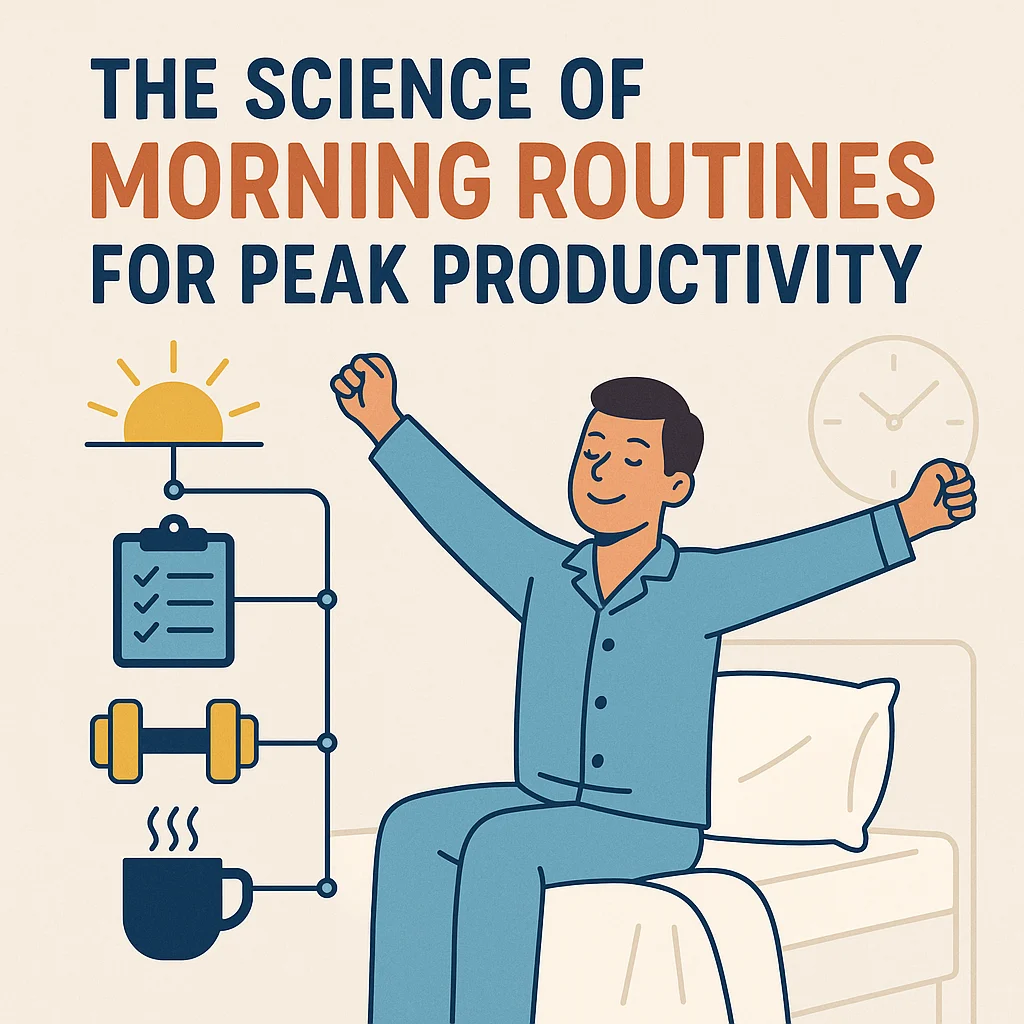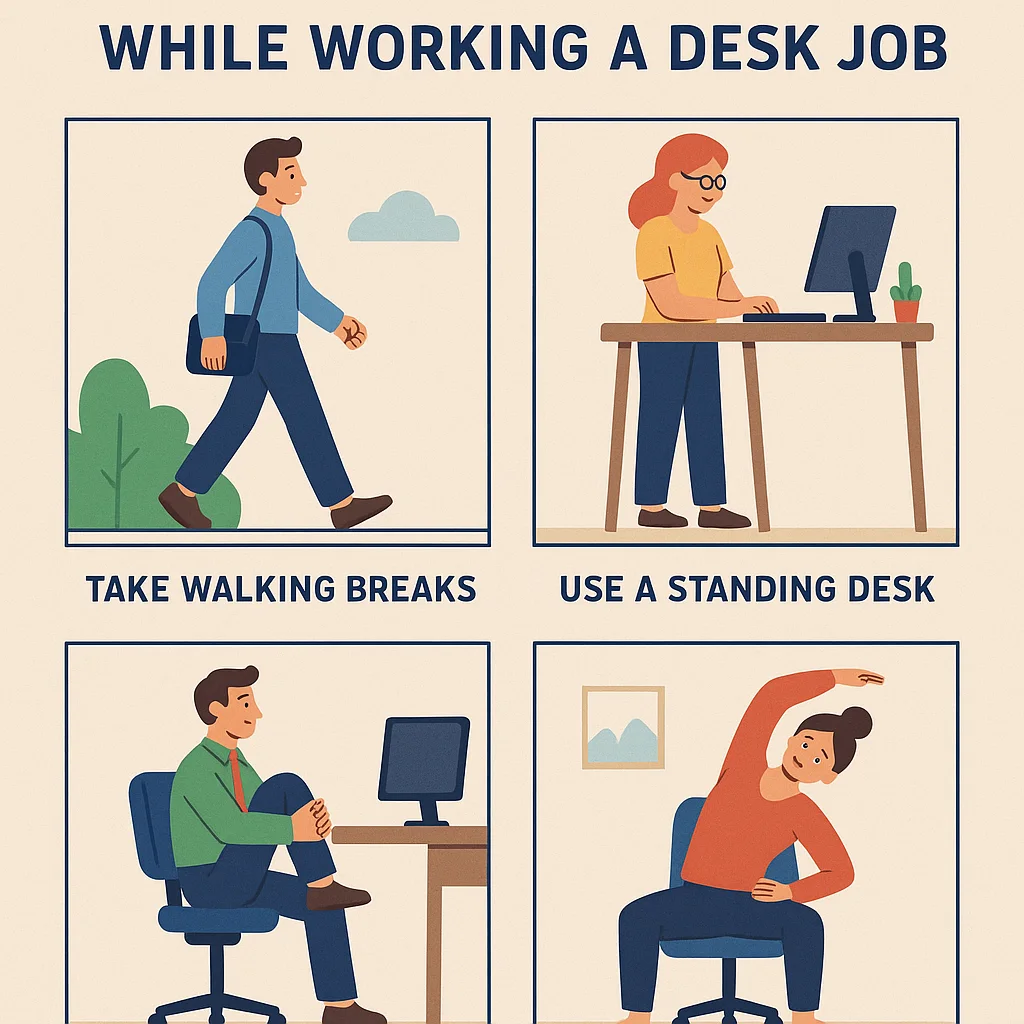From Benjamin Franklin to contemporary CEOs like Tim Cook and Oprah Winfrey, some of the most prosperous individuals in history have attributed their success, productivity, and focus to following a set morning routine for centuries. However, this goes beyond motivational jargon or folklore. The ability of morning routines to enhance brain function, mental clarity, and emotional regulation is being supported by an increasing amount of scientific research.
The science behind morning routines, their effects on productivity, and how to create your own ritual with scientific support to begin your day with strength and purpose will all be covered in this extensive guide.
Why Mornings Matter: The Biological Clock and Peak Function
1. Understanding Your Circadian Rhythm
The circadian rhythm, the body's internal 24-hour clock, controls hormone production, sleep, body temperature, and mental alertness.
-
Morning hours (roughly 6:00 a.m. – 11:00 a.m.) are when cortisol (the “alertness hormone”) is at its natural peak.
-
This makes the early hours ideal for focused work, strategic thinking, and creative problem solving.
-
As the day progresses, mental sharpness and self-control tend to decline, a phenomenon known as decision fatigue.
You can maximize both your physical and mental performance by coordinating your morning activities with your body's natural rhythms.
2. Dopamine and Motivation
A productive morning routine also taps into the dopaminergic system—the network in your brain responsible for motivation and reward.
-
Completing small tasks early in the day (like making your bed or exercising) gives you a dopamine boost, reinforcing positive behavior and creating momentum.
-
Tiny Habits author and psychologist B.J. Fogg claims that beginning with small, manageable tasks throughout the day increases motivation for bigger ones.
The Pillars of a Scientifically Proven Morning Routine
Now, let’s break down the key components of a high-performance morning routine, supported by psychology, neuroscience, and productivity science.
🌅 1. Wake Up at a Consistent Time
Why it matters:Consistent wake-up times enhance focus, emotional equilibrium, and sleep quality while assisting in the stabilization of your circadian rhythm.
Scientific Insight:Inconsistent sleep-wake patterns impair cognitive function and are linked to lower student GPAs, according to a Sleep Health study.
Pro Tip:
-
Aim to wake up within a 30-minute window daily—even on weekends.
-
Use smart alarm clocks that mimic sunrise to trigger your natural wake-up hormones.
🧘♂️ 2. Start with Mindfulness or Meditation
Why it matters:
Mindfulness reduces cortisol levels, improves emotional regulation, and sharpens attention.
Scientific Insight:Over the course of eight weeks, mindfulness meditation dramatically reduced participants' anxiety, depression, and sleep, according to a study published in JAMA Internal Medicine.
Practice ideas:
-
5–10 minutes of deep breathing or guided meditation (using apps like Headspace or Calm)
-
Journaling to clear mental clutter (e.g., morning pages or gratitude lists)
💦 3. Hydrate and Nourish
Why it matters:
After 7–9 hours of sleep, your body is naturally dehydrated, affecting brain function, energy, and concentration.
Scientific Insight:
A University of Connecticut study found that mild dehydration can increase feelings of anxiety and exhaustion and affect short-term memory.
Action Plan:
-
Drink a large glass of water first thing (add lemon for an extra kick)
-
Eat a balanced breakfast with protein, fiber, and healthy fats to stabilize blood sugar
🏃♀️ 4. Exercise or Move Your Body
Why it matters:
Physical activity increases blood flow to the brain, enhances cognitive function, and releases endorphins—your brain’s feel-good chemicals.
Scientific Insight:
A 2019 study from the University of British Columbia found that aerobic exercise boosts the size of the hippocampus, the brain area involved in verbal memory and learning.
Options:
-
Quick 10–15 minute HIIT session
-
Yoga or stretching
-
Brisk walk or cycling outdoors (bonus: morning sunlight boosts vitamin D and resets your circadian rhythm)
🗒️ 5. Plan Your Day with Intent
Why it matters:
Prioritizing tasks in the morning helps reduce overwhelm, clarify goals, and set a proactive tone for the day.
Scientific Insight:According to the Zeigarnik Effect, which bears the name of psychologist Bluma Zeigarnik, we have a tendency to recall incomplete tasks more vividly than finished ones. Putting your to-do list in writing facilitates externalization and lowers cognitive load.
Tools You Can Use:
-
Eisenhower Matrix (urgent vs. important)
-
Bullet Journal
-
Time-blocking in Google Calendar
💡 6. Avoid Digital Distractions
Why it matters:When you open social media or email as soon as you wake up, your dopamine system is taken over, stress levels rise, and you become reactive.
Scientific Insight:
A study from the University of California, Irvine found it takes an average of 23 minutes to refocus after a distraction.
Best Practice:
-
Avoid screens for the first 30–60 minutes
-
Use phone "Do Not Disturb" mode
-
Read, meditate, or write instead of scrolling
Real-World Morning Routines of High Performers
🚀 Tim Cook – Apple CEO
-
Wakes up at 3:45 a.m.
-
Exercises and clears emails
-
Maintains consistency, even on weekends
📚 Hal Elrod – Author of The Miracle Morning
-
Developed the "SAVERS" routine: Silence, Affirmations, Visualization, Exercise, Reading, Scribing
🧘♀️ Oprah Winfrey
-
Begins with meditation and spiritual reading
-
Followed by a workout and protein-rich breakfast
While your routine doesn’t need to mirror theirs, these examples illustrate the deliberate structure used by top performers.
How Long Should a Morning Routine Be?
No "one size fits all" solution exists. While some people benefit more from a 90-minute ritual, others can get the same results with shorter routines in 20 to 30 minutes.
Start small with 1–2 practices, then build gradually. The consistency matters more than the duration.
Overcoming Common Obstacles
💤 “I’m not a morning person.”
-
Try shifting your bedtime earlier by 15-minute increments.
-
Use sunlight exposure and exercise to reset your biological clock.
⏰ “I don’t have time.”
-
Wake up 20–30 minutes earlier.
-
Eliminate time-wasters like late-night scrolling.
🧠 “I forget what to do.”
-
Use a checklist or habit-tracking app.
-
Set reminders or post sticky notes on your mirror.
The Role of Evening Routines
Your morning starts the night before. A solid evening routine helps:
-
Improve sleep quality
-
Reduce cortisol and racing thoughts
-
Set the tone for a productive next day
Science-backed tips:
-
Avoid screens 1 hour before bed
-
Keep room cool and dark
-
Go to bed at the same time each night
-
Avoid caffeine and alcohol late in the day
Sample Morning Routine (45 Minutes)
-
6:30 a.m. – Wake up and drink water
-
6:35 a.m. – 5-minute meditation or breathwork
-
6:45 a.m. – 15-minute bodyweight workout
-
7:00 a.m. – Shower and protein smoothie
-
7:15 a.m. – Review top 3 goals for the day
-
7:30 a.m. – Start first deep work block
The Compound Effect of Morning Routines
Morning routines provide compounding returns, much like investing. After a week, the advantages—better mood, increased focus, and better sleep—increase over time.
After a few months, you may notice:
-
Enhanced creativity
-
Greater discipline
-
Increased resilience
-
More control over your time and energy
And just like any habit, the key is consistency, not perfection.
Final Thoughts
The science is clear: a well-planned morning routine creates the conditions for long-term success, increased productivity, and improved mental health. You can build a system that helps you achieve your goals rather than hindering them by coordinating your habits with the natural rhythms of your body and brain.
Taking charge of your mornings is one of the most life-changing choices you can make, regardless of your occupation—creative professional, remote worker, student, or entrepreneur.
So don’t wait. Start tomorrow—on purpose.




Leave a Reply